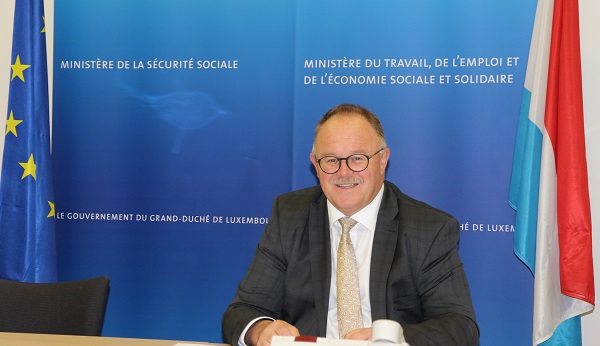 Romain Schneider, Luxembourg's Minister of Social Security;
Credit: MSS_GOUV-LU
Romain Schneider, Luxembourg's Minister of Social Security;
Credit: MSS_GOUV-LU
Luxembourg's Minister of Social Security Romain Schneider participated in yesterday's informal videoconference of the Employment, Social Policy, Health and Consumer affairs (EPSCO) council on the subject of recovery.
The meeting focused on reviving the European Union (EU) following the COVID-19 pandemic. In this context, Minister Romain Schneider praised the efforts of the European Commission regarding the recovery plan adopted on 27 May 2020 under the slogan "repair and prepare for the next generation". Minister Schneider recalled that the European basis of social rights must represent the compass for the implementation of a true social dimension of recovery, in order to ensure the well-being of all EU citizens.
Ministers also discussed the flexible forms of work put in place during the crisis and the lessons to be learned. They agreed that certain alternatives, such as teleworking, will be implemented in the long term. Nevertheless, Minister Romain Schneider maintained that it is important to have a clear distinction between working time and personal time: “The flexibility to work from home and the right to disconnect must go hand in hand".
These new forms of work are also linked to digitalisation. Indeed, discussions also touched on the importance of education and training in digital skills in order to improve the resilience of the economy, businesses and the workforce. In this context, Luxembourg wishes to pay attention to vulnerable groups such as low-skilled workers and workers from immigrant backgrounds, as well as pupils and students from socially disadvantaged backgrounds.
Discussions continued on the protection and promotion of equality between women and men, in particular with regard to the vulnerable groups affected by the COVID-19 crisis. In this context, Luxembourg's Social Security Minister presented the various measures that Luxembourg implemented during confinement, including the adaptation of family leave and the creation of a hotline and an online platform for victims of domestic violence.
Finally, Minister Romain Schneider stressed the importance of continuing to invest in the Reference Implementation for a National Application (RINA) project. RINA is an IT tool developed under the aegis of the European Commission for the electronic management and exchange of files between the competent social security institutions of European countries and plays a key role in the implementation at the national level of the EU's Electronic Exchange of Social Security Information (EESSI). Despite the importance of this project, the European Commission unilaterally decided at the beginning of the year to no longer manage and finance the project until June 2021, after which the Member States will have to take over. However, the programme provided for a much longer management and funding horizon by the European Commission.
Minister Romain Schneider thus called on the Commission to have in-depth discussions with the Member States in order to develop a feasible and pragmatic scenario, which will allow the EESSI to function properly under conditions acceptable to all stakeholders. He concluded: "This is of the utmost importance for exchanges between our social security systems".








